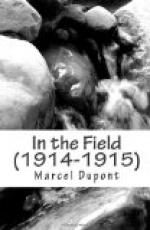I had great difficulty in preventing my men from firing. It was necessary to eke out our cartridges with the utmost care, for, owing to some mistake in the transmission of orders, our supplies had not been replenished since the day before, and we had used a great many in the fighting round Bixschoote. A like prudence was not, however, observed all along the line, for every now and then the trenches would be suddenly illuminated at a point where for a few seconds a useless volley would ring out. Then everything relapsed into darkness and immobility.
Towards Steenstraate, too, the firing seemed to be dying down. I looked at my watch. It was half-past six. This was the hour when as a rule our men began to feel hungry, and when in each troop the Chasseurs would set out, pannikin in hand, towards the smoking saucepan where the cook awaited them wielding his ladle with an important air. But on this particular evening no one thought of eating. We seemed all to feel that our work was not yet over, and that we had still a weighty task on hand. It was certainly not the moment to light fires and make soup; no doubt the Prussians were brewing something for us of a different kind, and it would never do not to return their compliments promptly.
Ready? Yes, we were ready. I turned and looked back into the trench. All my brave fellows were standing, their eyes turned to me, and seemed bent on divining by my attitude or gestures any new effort I might be about to ask of them. The pale light of the moonbeams struck full on their faces, leaving their bodies shrouded in the darkness of the trench. What a strange and comforting spectacle it was! In every eye I read calm courage and absolute confidence.
Whenever I feel weary or depressed, inclined to curse the slowness of our advance and the thousand miseries of war, I need only do what I did that evening. I need only turn to my Chasseurs and look into their eyes without a word; there I read so many noble and touching things that I am ashamed to have felt a momentary weakness.
They do not ask the why and the wherefore of things. They live from day to day, weighed down by hard work. To them the actual fighting is a rest and a delight. As soon as it is over they have to resume the hard life of cavalrymen on active service, spend all their time looking after their horses, fetching rations and forage, often from a considerable distance, cleaning harness and arms, and every night contriving some sort of quarters for themselves and their beasts in the squalor of half-destroyed or abandoned villages, quarters they must leave on the morrow. Yet nothing seems to depress them. They preserve all the eagerness of the first few days and that imperishable French gaiety which is an additional weapon for our troops.
That evening I felt them vibrating in unison with me more keenly than ever.




